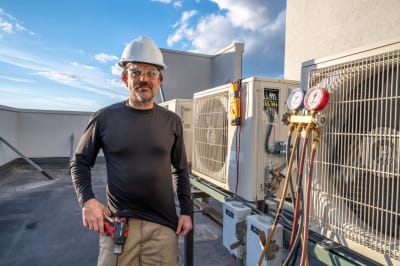Numerous factors determine whether or not an aspiring HVAC technician in Detroit, Michigan, will become successful on the job. Of all these factors, the most important is the level of training received beforehand.
Those who acquire high-level training from high-quality training programs are more confident on the job and versatile. If you are an aspiring HVAC technician in Detroit looking for the right institution to attain this level of training, then you have come to the right page.
Below is a comprehensive list containing the best and most notable training programs for future HVAC technicians in and around the city. We have also included a few words on why they deserve your time and attention.
How to Become an HVAC Technician in Detroit
Just as it is in most states and cities in the country, HVAC technicians in Detroit are not mandated by law to have advanced degrees before they can practice professionally. This means that aspiring HVAC technicians in the city can simply acquire training on the job by enrolling in an apprenticeship program.
Nonetheless, those who wish to obtain advanced certificates and degrees may also choose to do so by enrolling in a trade school or college program.
After training, the next important step in becoming an HVAC technician in Detroit is to become licensed. Candidates must be at least 18 years old and must attain a passing score of at least 70% in a licensing exam to receive their license.
From here, they may obtain more essential certifications such as NATE, OSHA, and EPA.
Top HVAC Technician Schools in Detroit, Michigan
These are a few of the Top HVAC Technician schools in Detroit, Michigan:
Wayne County Community College
Detroit, MI Online + Campus
Wayne County Community College is one of the premier destinations for acquiring high-level HVAC training in the Detroit area. The school has numerous campuses located all across the city.
Tuition
$3,263 - $3,998 per YearContact
(313) 496-2600
studentservices@mail.wcccd.edu
Henry Ford College
Dearborn, MI Online + Campus
Undoubtedly, one of the most popular and most trusted institutions in Detroit, Henry Ford College, is another viable destination for obtaining high-level HVAC training under the tutelage of excellent instructors with ample experience.
Tuition
$2,664 - $6,744 per SemesterContact
(313) 845-9600
enrollmentservices@hfcc.edu
Macomb Community College
Warren, MI Online + Campus
The Macomb Community College Center Campus offers high-level training for aspiring HVAC technicians in Detroit and around the state. What sets the program apart is focusing more on an industrial approach to HVAC technology.
Tuition
$111 - $270 per CreditContact
(586) 445-7999
answer@macomb.edu
Oakland Community College
Auburn Hills, MI Online + Campus
The Auburn Hills Campus of Oakland Community College offers advanced training programs for aspiring HVAC technicians nationwide.
Tuition
$107 - $205 per CreditContact
(248) 232-4100
ContactUs@oaklandcc.edu
Explore nearby states for training and education:
Explore detailed steps and the state’s licensing requirements:





